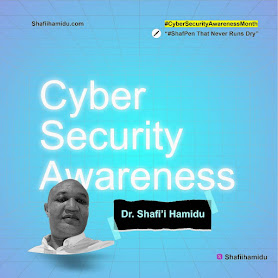“Not to know is bad; not to wish to know is worse.”—African Proverb
Ah, October, the month of falling leaves, pumpkin-spiced everything, and, of course, Cybersecurity Awareness! As we ease out this remarkable month dedicated to the virtual vigilantes of the digital realm, let's embark on a satirical journey to explore the need for cyber awareness in Nigeria, a nation that's no stranger to the incredible dance of the cyber criminals.
Imagine, for a moment, a horde of Cyber-Jarumai led by a virtual Queen Amina of Zazzau or a Barbushe of Kano, fiercely defending their digital territory. Jarumai simply means heroes, in the form Greek Spartans. In their quest for supremacy, they wield firewalls and antivirus swords, clad in the armour of secure passwords and knowledge, all while wearing the stylish cape of cyber vigilance. Chai, imagination wan ki mi! But, you may wonder, why should we, the ordinary citizens, concern ourselves with such matters?
The digital realm is as much a battlefield as any ancient battleground. It's where the economy thrives, personal data flows, and communication prospers. As we navigate this modern-day Iliad, the Cyber-Jarumai among us play a critical role in securing our virtual Troy (ganuwa) from the lurking Trojan horses.
Let's delve into the ironic side of things, shall we? Cybercrime can be quite the economic spoiler. Take, for instance, a scenario where an enterprising cybercriminal decides to ransack a financial institution. The result? Oh, just a little thing like potential financial chaos, loss of customer trust, and possibly even a dip in the country's economic growth. A mere trifle!
In a land where digital transactions have become as common as jollof rice at a party, cyberattacks on financial institutions can be as devastating as an inferno in Onisha market. Your hard-earned savings could vanish quicker than Suya at a Zaria Street corner! Dey play.
But fret not, dear citizens, for this is where our Cyber-Jarumai come to the rescue. In this Cybersecurity Awareness Month, let's align ourselves with the rising Cyber-Jarumai to reinforce our digital defenses. To do this, start by raising your awareness about common cyber threats, phishing scams, and secure online practices. Knowledge is your shield in this digital battlefield. Additionally, fortify your online presence by using strong, unique passwords, as simple ones are no match for the digital adversaries. Keeping your devices and software up to date is akin to maintaining your armour – a crucial element in defending the digital realm. Furthermore, don't hesitate to report any suspicions invader, be it a dubious email or website; timely reporting is your sword against cyber villains. In this collective effort, remember to share your knowledge of cyber hygiene with friends and family, for a united front is essential in this ongoing battle.
In the spirit of Cybersecurity Awareness Month, let's embrace our roles as digital defenders, equipping ourselves with knowledge, vigilance, and a strong sense of collective responsibility. Together, we form a formidable force against cyber threats, ensuring a safer and more secure digital landscape for us all.
In our satirical odyssey through the digital battlefield, we've discovered the importance of Cybersecurity Awareness. The economic implications of cybercrime are far from funny, and we must take the initiative to protect our virtual assets.
As we commemorate this October, let's not only savour our pumpkin spiced lattes and snuggle into warm sweaters but also equip ourselves with digital armour, becoming the much-needed rising Cyber-Jarumai Nigeria desperately needs. Remember, our digital ganuwa is worth defending, and together, we can stand strong in the face of digital invaders (mahara).
Here's to a secure and cyber-vigilant October!
Dr. Shafi’i Hamidu

